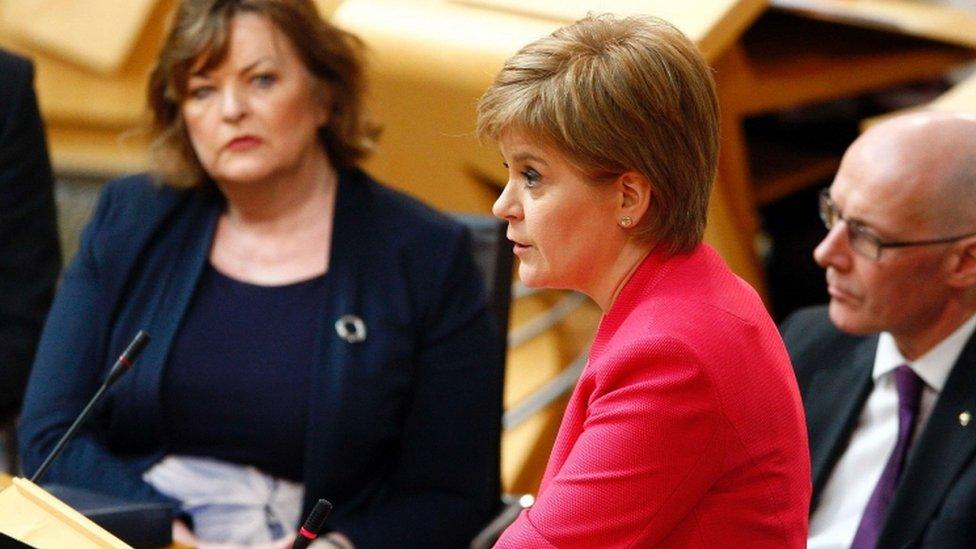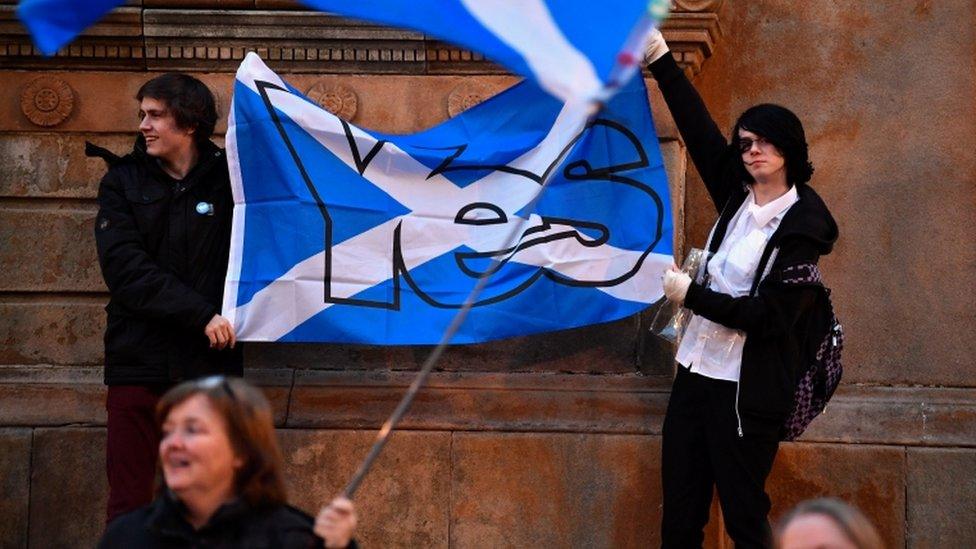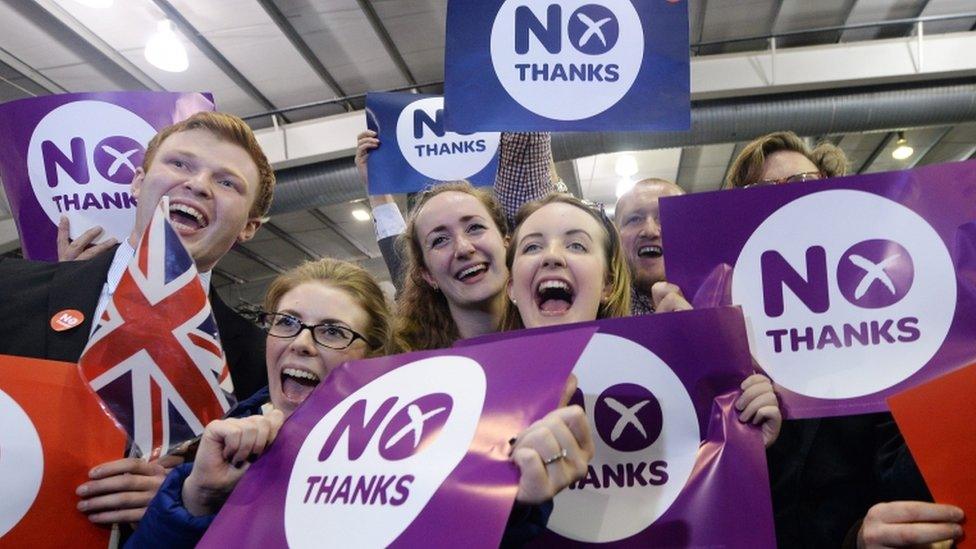Scottish independence: Holyrood to debate referendum call
- Published

Nicola Sturgeon wants a referendum to be held before the UK leaves the EU - but the UK government has already said it will block the move
The Scottish Parliament is to start a two-day debate on whether to seek permission to hold a second independence referendum.
The Scottish government wants to hold a referendum in the autumn of 2018 or the spring of the following year.
But the Conservatives have tabled an amendment, external calling for the parliament to rule out a referendum before April 2019.
The UK is currently expected to leave the European Union on 29 March 2019.
Scotland's First Minister, Nicola Sturgeon, said last week that a referendum would need to be held before Brexit, "or at least within a short time of it", to prevent Scotland facing a "lengthy period" outside both the EU and the single market if it becomes independent.
Her minority SNP government will ask MSPs to back its plans to ask Westminster for a section 30 order, which is needed to make a referendum legally binding.
The government is expected to win Wednesday's vote with the support of the Scottish Greens.
Prime Minister Theresa May said last week that "now is not the time" for a referendum, insisting that the focus should instead be on getting the best deal for the whole of the UK during the forthcoming negotiations with the EU.
Her comments were widely interpreted as suggesting she would block any attempt to hold a referendum before the UK leaves the European Union.
But Mrs May, who will formally notify the EU next Wednesday that the UK is leaving, did not rule out a vote on independence being held after Brexit.
Her Scottish secretary, David Mundell, later clarified that the UK government "will not be entering into discussions or negotiations about a Section 30 agreement" during the Brexit talks, and that any request "at this time" will be declined.

Opinion polls suggest voters are split over independence, and whether there should be another referendum
The Scottish government will now ask Holyrood to "acknowledge the sovereign right of the Scottish people to determine the form of government best suited to their needs".
The government motion asks MSPs for permission to "take forward discussions" with the UK government over a section 30.
It says this would allow the Scottish Parliament to legislate for a referendum that will "give the people of Scotland a choice over the future direction and governance of their country".
The motion says it would be for Holyrood to decide the timing and question for a referendum, and to set out who would be eligible to vote in it.
It says the referendum would "most appropriately" be held between the autumn of 2018, when there is expected to be clarity over the outcome of the UK's Brexit negotiations, and the spring of the following year, when the UK is due to leave the EU.
But Ms Sturgeon has indicated she would be prepared to discuss the timing of another vote with the prime minister.

Analysis by Philip Sim, BBC Scotland political reporter
The debate in parliament is likely to take on the air of an episode of Sportscene or Match of the Day where you already know the scores - we know who's going to win, but it will be interesting to see how the goals are scored.
What will be important is what happens next - how the impasse between the Edinburgh and London governments is settled.
Tellingly, the Conservative amendment for the debate calls for no vote "before April 2019" - a month which might just fit into Nicola Sturgeon's stated timetable, which included a period "within a short time after" Brexit is complete.
But if Mr Mundell's position holds and the UK government spurns any discussion during the Brexit process, that could push back a potential referendum until sometime in 2020 at the earliest.


Scotland voted by 55% to 45% to stay in the UK in the 2014 referendum
Speaking ahead of the Holyrood debate, Ms Sturgeon said it would be "democratically indefensible" for the prime minister to block a referendum if the Scottish Parliament voted in favour of holding one.
She added: "The sovereign right of the people of Scotland to determine the form of government best suited to their needs is a longstanding and widely-accepted principle.
"A hard Brexit threatens huge economic and social damage to Scotland, and the people must have the opportunity to choose a different, better path."
Scottish Greens co-convener Patrick Harvie confirmed his party would vote with the government, adding: "The people of Scotland deserve to have a choice, and it's appalling to see anti-democratic Tories trying to close down our options".
But the Scottish Conservatives, Labour and Liberal Democrats have all said they will vote against the motion.
Tory leader Ruth Davidson said it was clear that a majority of people in Scotland do not want a re-run of the 2014 referendum, when voters rejected independence by 55% to 45%.
'Hiding the facts'
She added that it was "utterly irresponsible" for Ms Sturgeon to trigger a campaign "while still hiding the facts on independence, such as the currency, EU membership and the price tag it would entail."
Her party's amendment to the Scottish government motion calls on the parliament to reject the proposal for a referendum before April 2019.
Scottish Labour leader Kezia Dugdale, who backs a federal solution for the UK, said the country did not need a repeat of the "divisions" of 2014, and claimed that Ms Sturgeon "wakes up every single day thinking of ways to engineer another referendum because leaving the UK is the only thing that matters to her."
Ms Dugdale also said the Scottish government had "ignored the will" of the Scottish Parliament on five occasions over the past year, when it had been defeated by opposition parties in votes over issues including fracking and the Offensive Behaviour at Football Act.
And Scottish Liberal Democrat leader Willie Rennie said it was "absurd for the SNP to put forward a referendum when there is no cast-iron guarantee that they will take Scotland back into the EU".
A live audience debate on Scotland's future will be broadcast on BBC1 Scotland from 18:50 until 19:30 on Tuesday